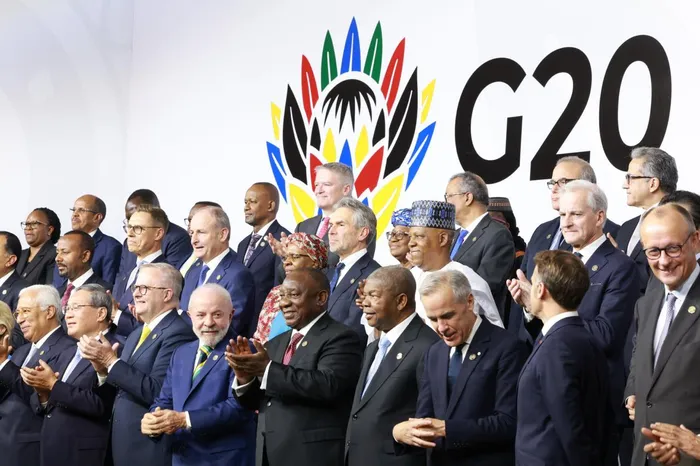EU, AU back call for global inequality panel as pressure mounts on G20 leaders
G20

The proposal has already been endorsed by President Ramaphosa, Spain’s Prime Minister Pedro Sánchez and Brazil’s President Luiz Inácio Lula da Silva. Support is also growing across academia, civil society and former political leaders.
Image: Supplied/GCIS
The European Council and the African Union (AU) have thrown their support behind a proposal to create a new International Panel on Inequality (IPI), as momentum builds around a global push to confront what experts are calling an “inequality emergency.”
Their backing comes amid growing pressure on G20 leaders from more than two dozen former heads of state and over 700 leading economists, who are urging the establishment of a permanent, science-based global body, described as an “IPCC for Inequality”, to help governments craft coordinated responses to rising inequality.
The call is set to dominate discussions at the G20 Leaders’ Summit in Johannesburg this weekend.
The proposal is contained in a landmark report produced by the G20 Extraordinary Committee of Independent Experts on Global Inequality, chaired by Nobel Prize–winning economist Joseph Stiglitz.
Appointed by President Cyril Ramaphosa under South Africa’s G20 Presidency, the committee presented its findings to G20 leaders on Saturday.
The presentation was delivered by UNAIDS executive director and UN under-secretary general Winnie Byanyima and renowned economist Professor Jayati Ghosh of the University of Massachusetts-Amherst.
The European Council is a collegiate body and a symbolic collective head of state, that defines the overall political direction and general priorities of the European Union.
European Council President António Costa welcomed the IPI proposal, emphasising that global debt dynamics must be central to its work. He described inequality as “a feature of the international financing system” — not a flaw — arguing that structural reforms are urgently needed.
“Inequality is not a bug, it is a feature of the international financing system and it must be reversed. We cannot do this on our own, we need other economic powers to live up to their responsibilities,” Costa said.
“Today 3.4 billion people live in countries that spend more on debt interest than on health or education. We must lower the high debt servicing costs that many developing countries face. And we need to enhance debt transparency by all actors.”
The AU has also welcomed the initiative, saying the IPI could help ensure African priorities — including debt reform and fairer global taxation — receive sustained and evidence-based attention.
“The African Union fully endorses the recommendations contained in the Reports of the Panel of African Experts and the Extraordinary Committee of Independent Experts on Global Wealth Inequality, calling on the G20 to transform the commitments made into actions that lead to their resolute and coordinated implementation,” said João Lourenço, President of Angola and acting president of the AU.
Meanwhile, Ghosh told leaders that inequality has reached crisis proportions, warning that extreme wealth concentration is destabilising economies, undermining democracy and eroding social cohesion.
“We found that the world’s richest 1% have captured over 40% of all new wealth created since 2000, while the bottom half of humanity have received just 1%,” she said.
“Extreme inequality undermines political stability and democracy. Economic inequalities tend to translate into political inequalities — the power to affect laws and policies and unequal access to justice.”
The report points to a dangerous convergence of trends: the ballooning of private wealth alongside the erosion of public wealth, widening intergenerational gaps, and the powerful role of inherited fortunes, with more than $70 trillion expected to be passed down to heirs in the coming decade.
Ghosh also warned that inequality is worsening climate outcomes.
“The excessive carbon emissions generated by the very richest disproportionately contribute to climate change,” she noted.
To tackle these issues, the committee has proposed the establishment of an International Panel on Inequality — a lean, globally coordinated scientific body that would provide authoritative, independent assessments on inequality trends, drivers and policy responses.
“Fundamentally, inequality is a policy choice and therefore a political choice,” the report notes.
The proposal has already been endorsed by President Ramaphosa, Spain’s Prime Minister Pedro Sánchez and Brazil’s President Luiz Inácio Lula da Silva. Support is also growing across academia, civil society and former political leaders.
Using its presidency of the G20, South Africa has made inequality the defining theme of its leadership year, a stance President Ramaphosa reinforced in his opening address at the summit.
He said South Africa was “deeply aware of the profound responsibility” of steering the G20 at a time when global fractures are widening, and stressed that the priorities of the Global South, particularly tackling inequality, had been woven into every area of the G20’s work.
Byanyima called South Africa’s leadership “historic,” praising the country for elevating inequality to the top of the global agenda.
“I am once again a proud African today as our continent leads the world on this issue,” she told leaders, thanking President Ramaphosa for commissioning the committee’s work,” she said.
Byanyima outlined a suite of inequality-reducing policies governments can adopt: boosting access to essential services, reforming intellectual property regimes, strengthening public infrastructure, curbing monopolies, expanding fiscal space, and cooperating on global tax and debt reforms.
But she warned that many governments lack the data and technical tools needed to implement effective reforms — one of the key reasons the IPI is urgently needed.
“We envisage a globally balanced international coordinating body that would provide a technical service,” she said. “An International Panel on Inequality would bring together technical expertise worldwide to track inequality and assess what is driving it.”
BUSINESS REPORT